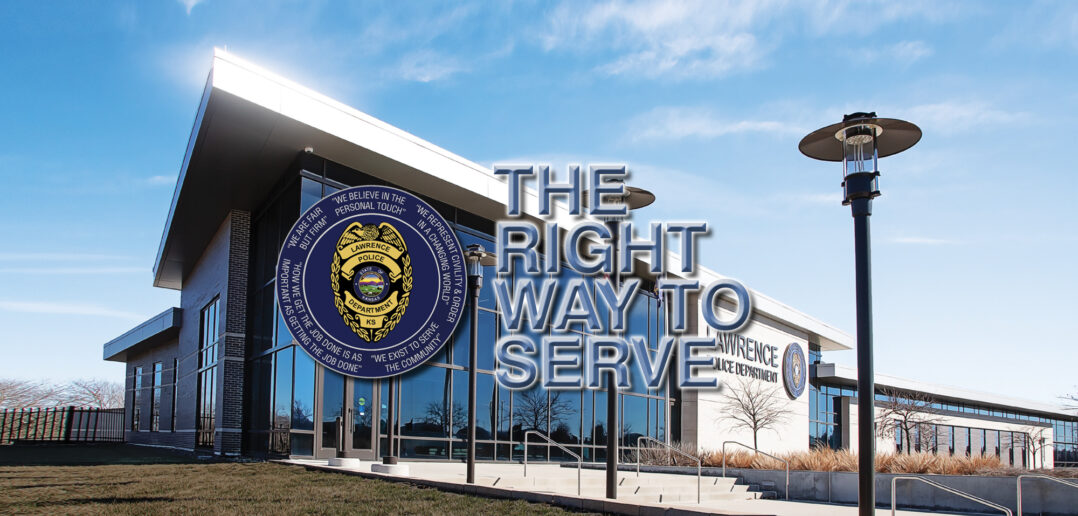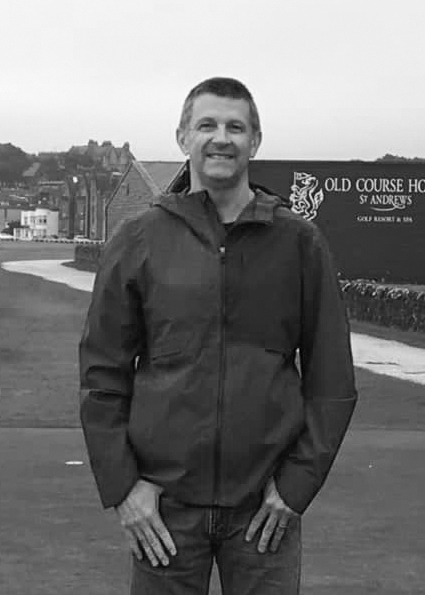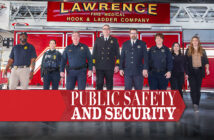| story by | |
| photos by | Steven Hertzog |
| OPEN A PDF OF THE ARTICLE |
Becoming a fabric of the community and guided by its residents, local police departments join together using a team approach to police the community the way it wants to be policed.
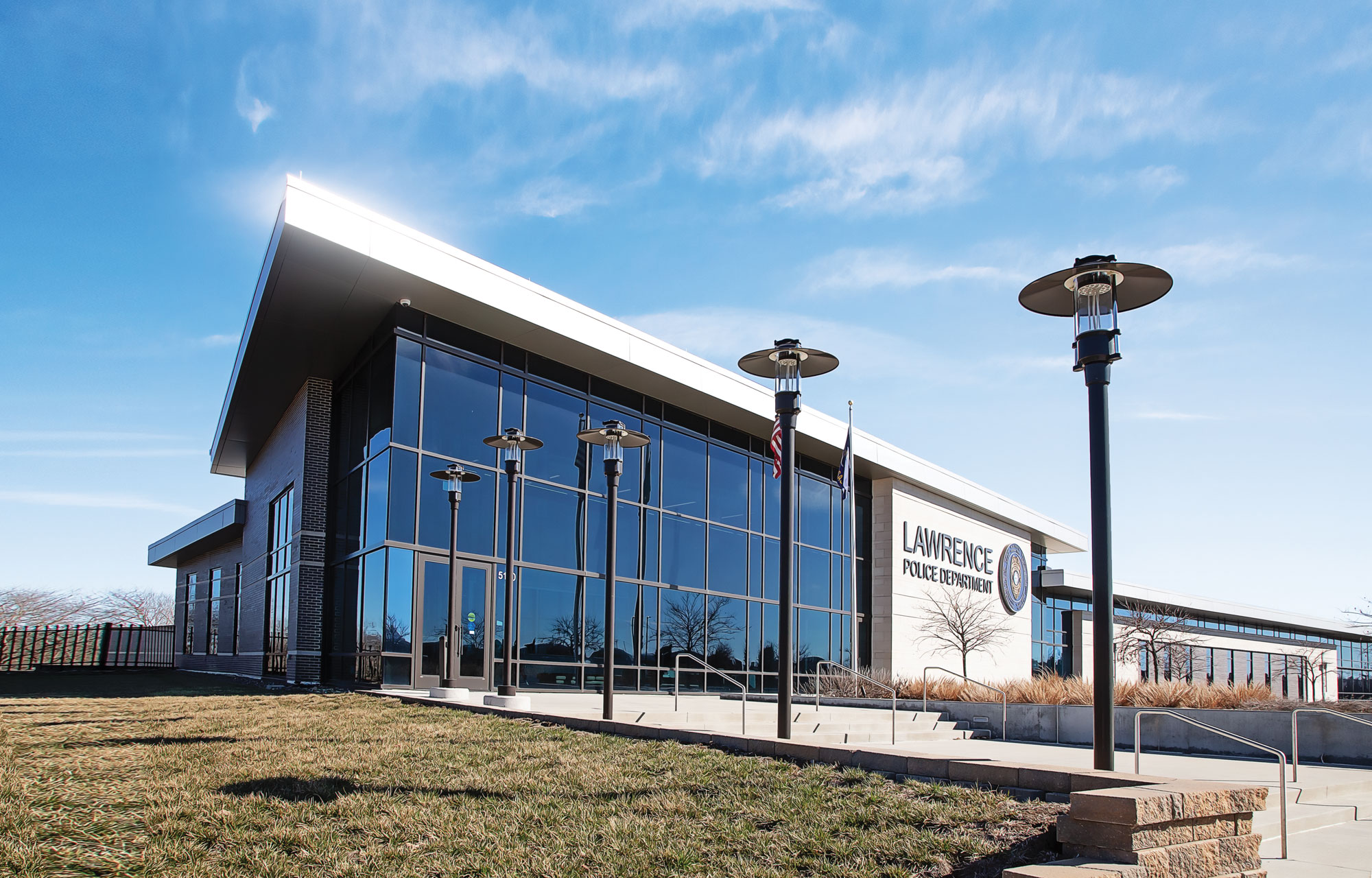
The new Lawrence Police Department Headquarters
Anthony Harvey Jr. grew up in East Lawrence, in an area where many of his neighbors held a rather negative view of local police. And that’s putting it nicely.
“We were not fond of police,” Harvey Jr. says. “We didn’t know about them. There were not many interactions. The sheriff’s department’s gas pumps were located by our house, so that was really the only time I’d see them. I also grew up seeing bad things on the news all the time.”
One day before his 10th birthday, Harvey Jr. witnessed police officers come to his house and arrest his father, adding further to his skepticism of the men in blue.
“I saw my hero taken away by the police,” he says. “It made me feel like the police were out to get us. It was just seeing situations like that and not understanding it.”
Harvey Jr. says those experiences drove him into some dark times. But during his fourth- or fifth-grade year—he can’t remember which—a single interaction changed the course of his life.
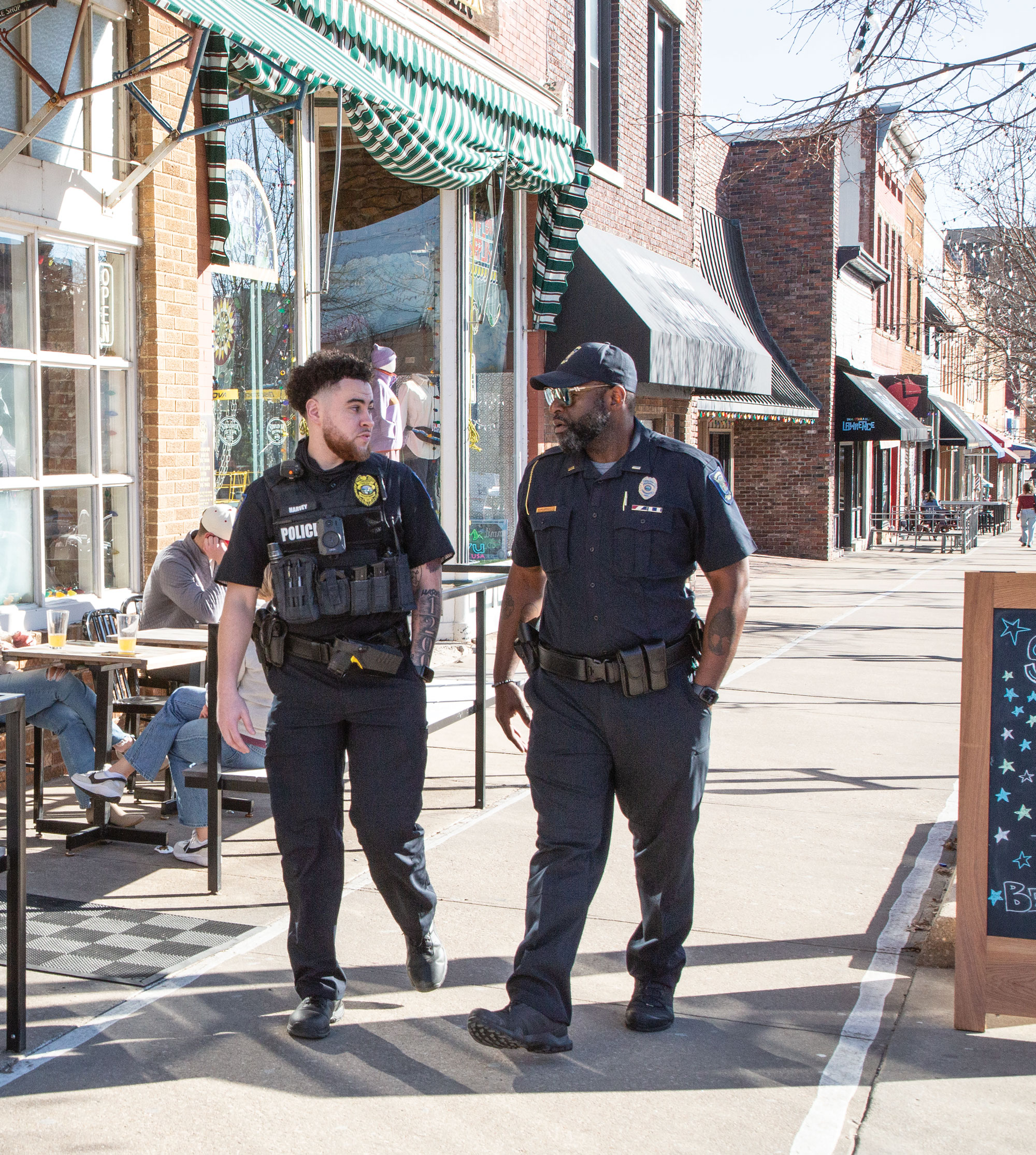
Officer Anthony Harvey, Jr
and Lieutenant Myrone Grady patrol Downtown Lawrence
Myrone Grady, a then Lawrence police officer serving as a school resource officer (SRO) at South Junior High School, visited Harvey Jr.’s grade school and spoke with a youngster who had never had a one-on-one interaction with an officer. And Harvey Jr. listened.
“I found out he was just a regular dude like me,” he says. “He instilled in me the importance of knowing who you are and who you want to be.”
Harvey Jr. says he stayed in communication with Grady, now a lieutenant and executive director of diversity and community engagement with the Lawrence Police Department, on an almost-daily basis. When he got to middle school, he met more officers, rarely talking with them about law enforcement but instead focusing on life and realizing potential—them showing him they cared.
Those interactions led to Harvey Jr. completing a degree in criminal justice at Newman University, in Wichita. Today, he’s Officer Anthony Harvey Jr., of the Lawrence Police Department and the embodiment of what he used to be so suspicious.
“I just knew I wanted to be the cop that I needed back then,” says Harvey Jr., who also serves as an assistant basketball coach at Lawrence High School. “I want to be that cop who wants to get together and go to lunch and talk, give kids the opportunity to be who they are.
“I’m just blessed I met Lieutenant Grady,” he adds. “He’s like every father figure I’ve met in my life. And he changed my perception of what it means to be a policeman.”
Though he most likely would bristle at the suggestion, in many ways Officer Anthony Harvey Jr. is the face of today’s Lawrence Police Department, an organization with people of varied pasts and a wide array of backgrounds and experiences.
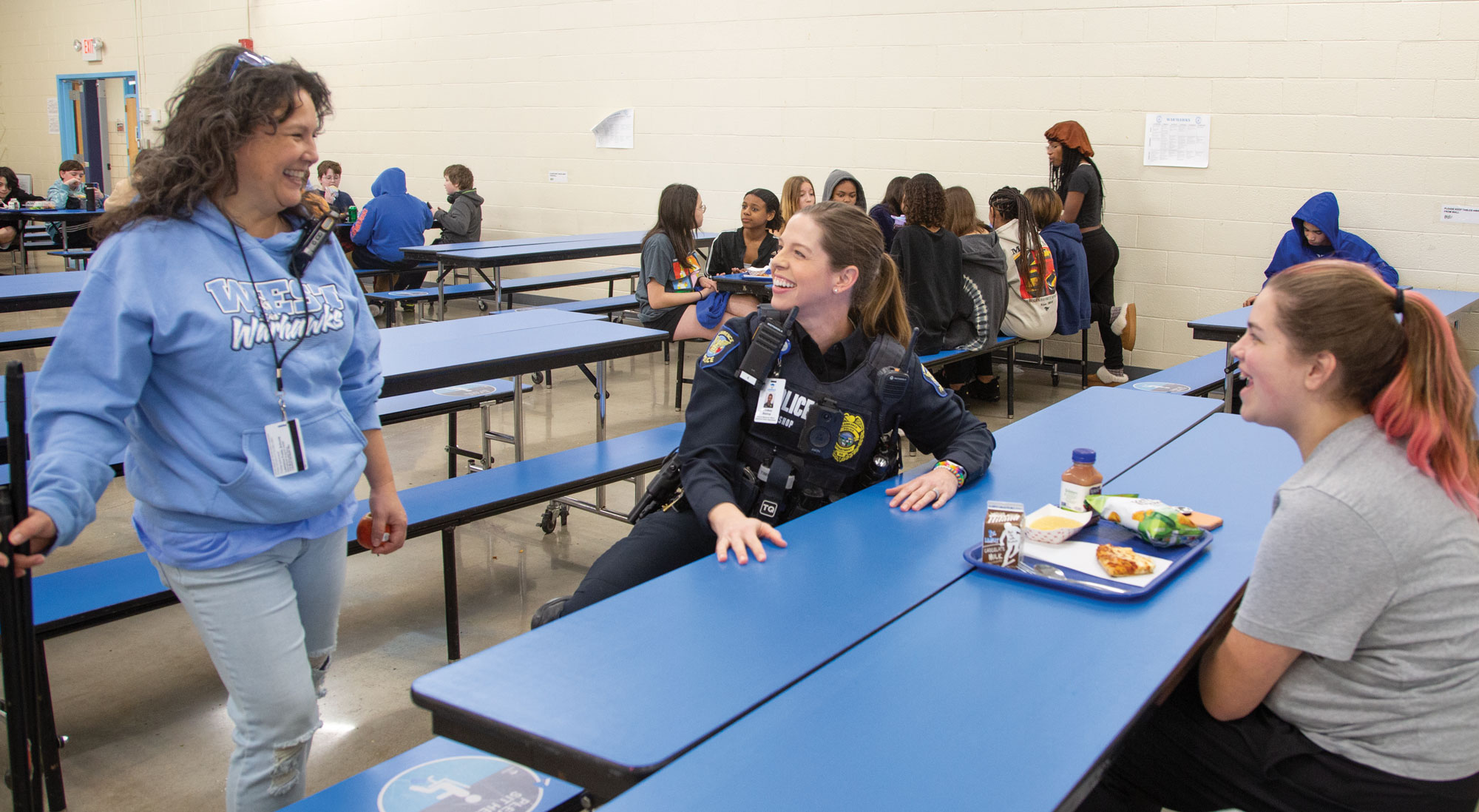
Police officer Lindsay Bishop and West Middle School Interim Principal Therese Brink Edgecomb spending time with students during lunch
Policing for This Community
Lawrence Police Chief Rich Lockhart, who arrived in town a little more than two years ago, calls his current position his “Goldilocks job.” After 26 years in Kansas City, Missouri, with 310 square miles and a sizeable dose of violent crime, followed by a few years in much smaller Warrensburg, Missouri, he’s found the size of Lawrence to be just right.
Lockhart oversees an award-winning department authorized for 152 officers. The lion’s share of those are patrol units that rotate among four shifts. He also has an investigations division, divided into three specialized units. The general investigations unit covers violent crimes like murder, battery and kidnapping, along with financial crimes. The special victims unit (SVU) works to solve sexual-and physical-abuse crimes with the expertise of two civilian investigators formerly employed by the Kansas Department for Children and Families. The division also has detectives specially trained in gangs and narcotics working in directed investigations. The department’s training division runs its own police training academy, approved by the Kansas Law Enforcement Training Center, at the site of the city’s old police station, on Bob Billings Parkway.
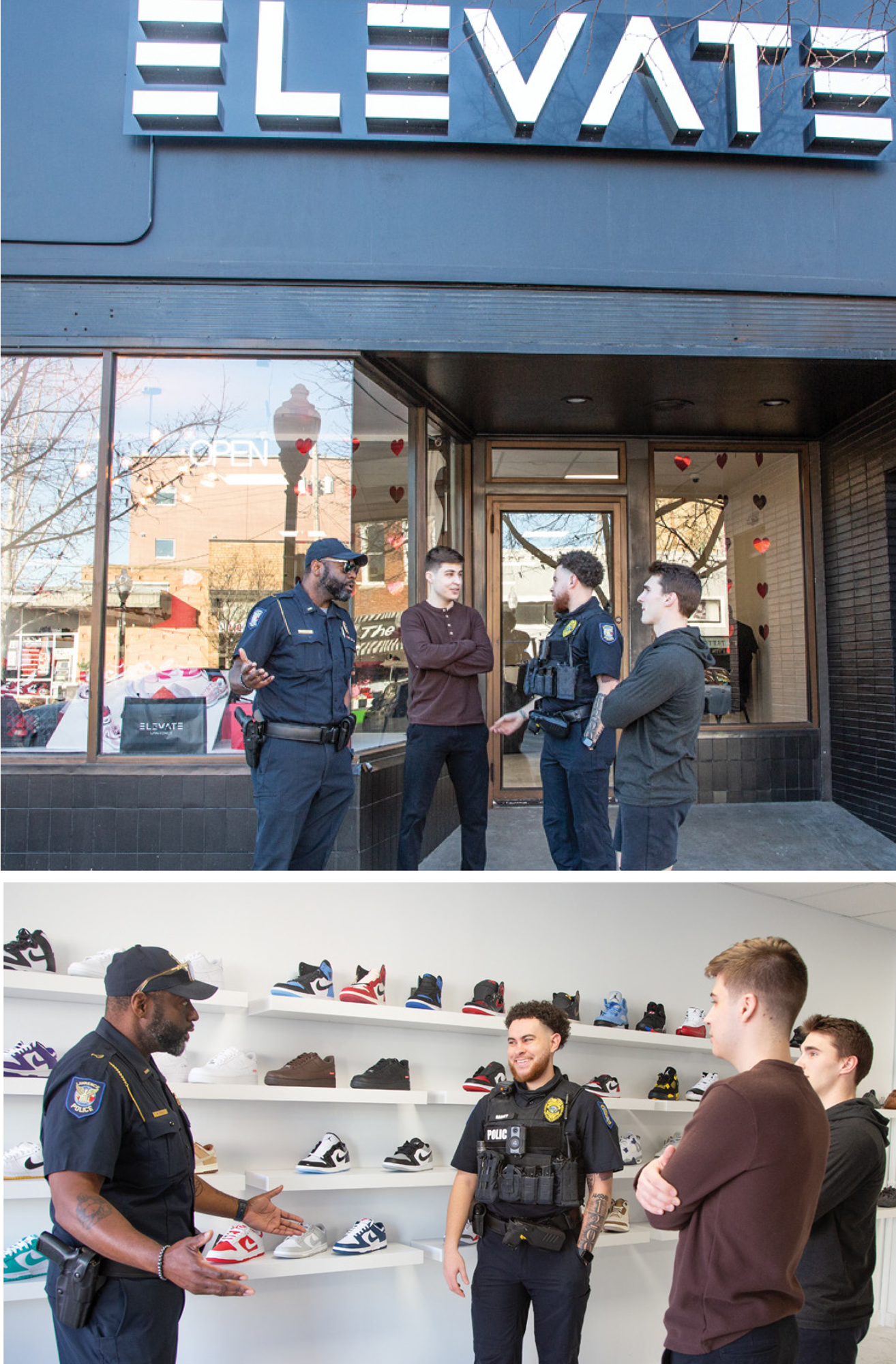
Officers Grady and Harvey enjoy engaging with the Lawrence public here talking with Elevate owner Ethan Bentzinger and friend/employee Wyatt Durland
It’s also an extremely diverse department, both in terms of demographics and backgrounds. The department, 13 to 14 percent of which consists of female officers, includes a detective who travels to Canada, Singapore and the United Kingdom every year to teach forensic video analysis and has a bachelor’s degree in both math and computer science. It also includes a woman with 28 years of experience working difficult SVU cases and a former member of the British military. Also, a corporal about to earn her Ph.D. and a former network TV journalist round out the group.
“The last academy class was one of the most diverse we’ve had,” Lockhart says. “Still, we know we need to work on it. We’re not where we want to be.”
No matter what division, unit, rank or position within the department, Lockhart says the goal is to reach out and forge relationships with those they protect and serve, to become a fabric of the community. He says it starts with the schools and working closely with children, educating them on things like drugs, alcohol and mental health. He promoted Grady to executive director of diversity and community engagement for that purpose. The department also has six SROs, one at each of Lawrence’s two high schools, and one at each middle school.
In fact, the SRO program has been so successful, Lawrence has had the SRO of the year in the state of Kansas each of the last two years.
Lockhart also proudly points to the Lawrence Kansas Police Department’s Handle With Care program, initiated in September 2022, which identifies students who have had police contact outside of school and alerts the school’s SRO to inform the students’ teachers to give them extra care in future interactions.
“The beginning of each school year, we do a lot of work with students,” Lockhart says. “In November 2022, we started foot patrols downtown to connect with the business community, make them feel safer and support them.”
Lockhart, who last year was appointed by Kansas Gov. Laura Kelly to the Kansas Commission on Police Officers’ Standards and Training, says sometimes the simple things can go a long way. He allows officers to wear sneakers when they’re out on special community-engagement assignments, because it allows them to relate to young people with whom they might interact.
“It’s all about trying to connect with people where they are,” he adds.
The department also recently implemented a partnership with the national Lights On! Program, in which, instead of writing a ticket for having a headlight or taillight out, they present a voucher to help get it fixed. Lockhart added a teen police academy for ages 14 through 18 to the department’s longstanding police camp for younger kids after seeing the need to build bonds at all ages. Two sessions are planned for this summer. LKPD officers passed out Popsicles at a local swimming pool last summer.
“In the end, this is a people business,” Lockhart says. “We need to police a community the way it wants to be policed. The only way to know how is by getting out and talking to them.”
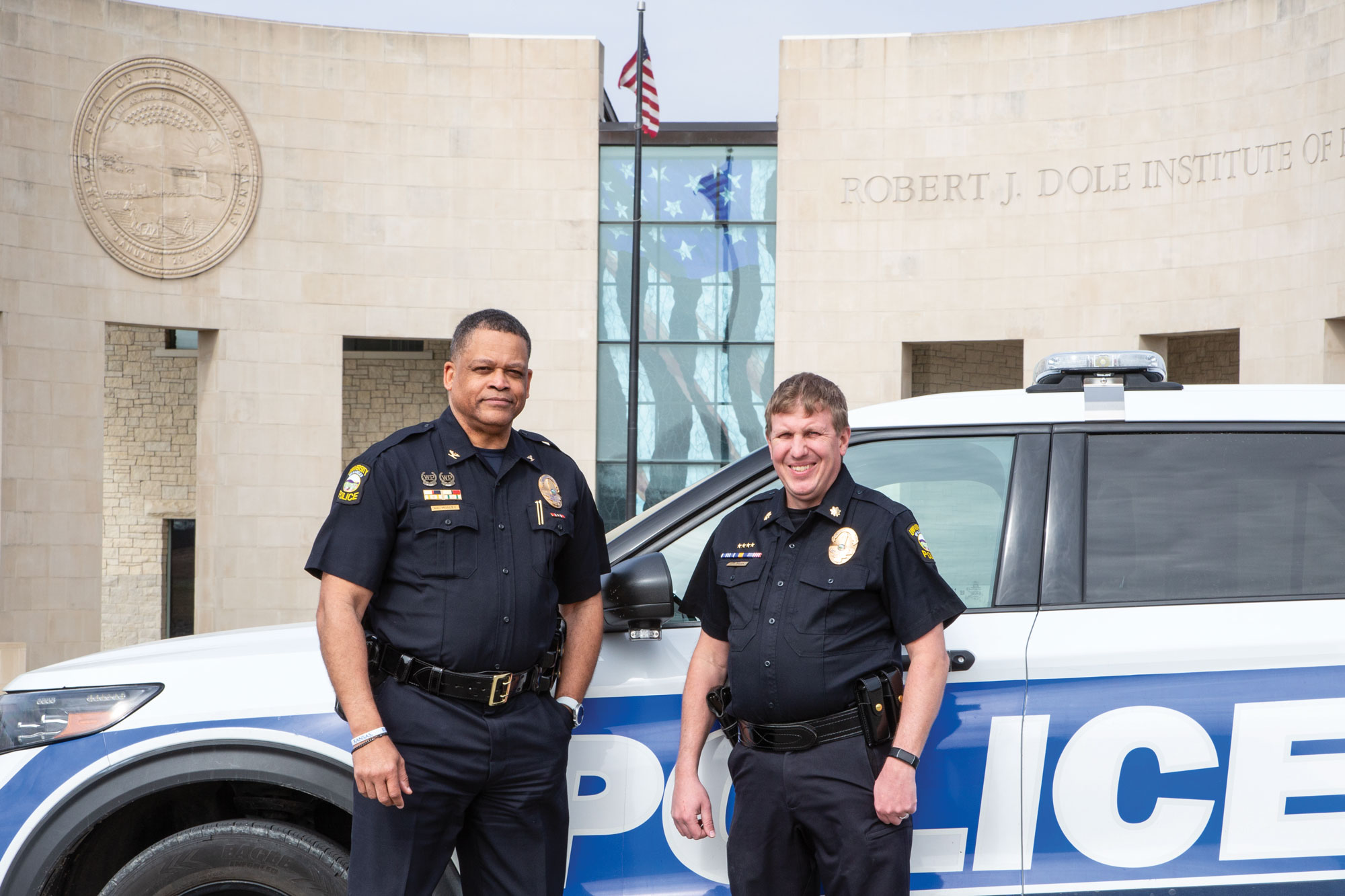
KU Police Chief Nelson Mosley and KUPD Deputy Chief James Druen
All in on Community Policing
The University of Kansas Police Department (KUPD) also has put a strong emphasis on community policing and forging strong relationships with the university community, especially since the arrival a couple years ago of Chief of Police Nelson Mosley.
Mosley was hired by the University near the end of the COVID-19 pandemic and was the first KUPD Chief hired from outside of the department, having served in the Wichita area. After a period of assessment, he began restructuring the department, with an emphasis on increasing transparency and strengthening its presence in the university community.
LOCAL MATTERS
Our Local Advertisers – Making a Positive Impact
“I wanted to enhance the department’s community policing efforts,” Mosley says. He adds that when he started his law enforcement career, officers would go to a scene, take a report and leave. “With community policing, we now take a closer look at the root cause of our calls and have better investigations, consistently asking ourselves, ‘What more can we do?’
“All of our officers should be good ambassadors for the department and the university as a whole,” he says.
The transient nature of college populations—every May, thousands of students graduate and leave the community, and every August thousands arrive as new students—can make relationship-building more challenging while also creating opportunities, Mosley says. The department has implemented procedures and systems it thinks will better support the needs of young adults, many of whom are living away from home on their own for the first time.
KUPD Deputy Chief James Druen points to the establishment of a Student Care Referral Team, a multidisciplinary team that works to give students seeking help all the resources they need. Mosley says his department, which consists of 35 sworn officers and 32 civilians, acts as a liaison with the University’s student groups, helping navigate through complicated matters such as the recent unrest between Israel, Hamas and the Palestinian community.
He also says the recent restructure of the department allows for more clear and consistent policies and procedures for KUPD officers to follow and execute.
“Chief Mosley brought in a team approach we didn’t have before,” he says. “It’s an easier way to navigate, especially with young officers. Now, there’s only one way to do something instead of being told different ways of doing things. We’ve also expanded our peer support program, increasing from one to three trained peer supporters that provide additional resources to our staff.”
“There’s a consistency in how to do things,” Mosley says.
For the KUPD, that consistency includes good communication among the department, campus community and its outside partners, which includes LKPD.
In fact, Lockhart says his department’s partnership with KUPD is so good, “it almost feels like one police department. They’ve been a good partner with us.”
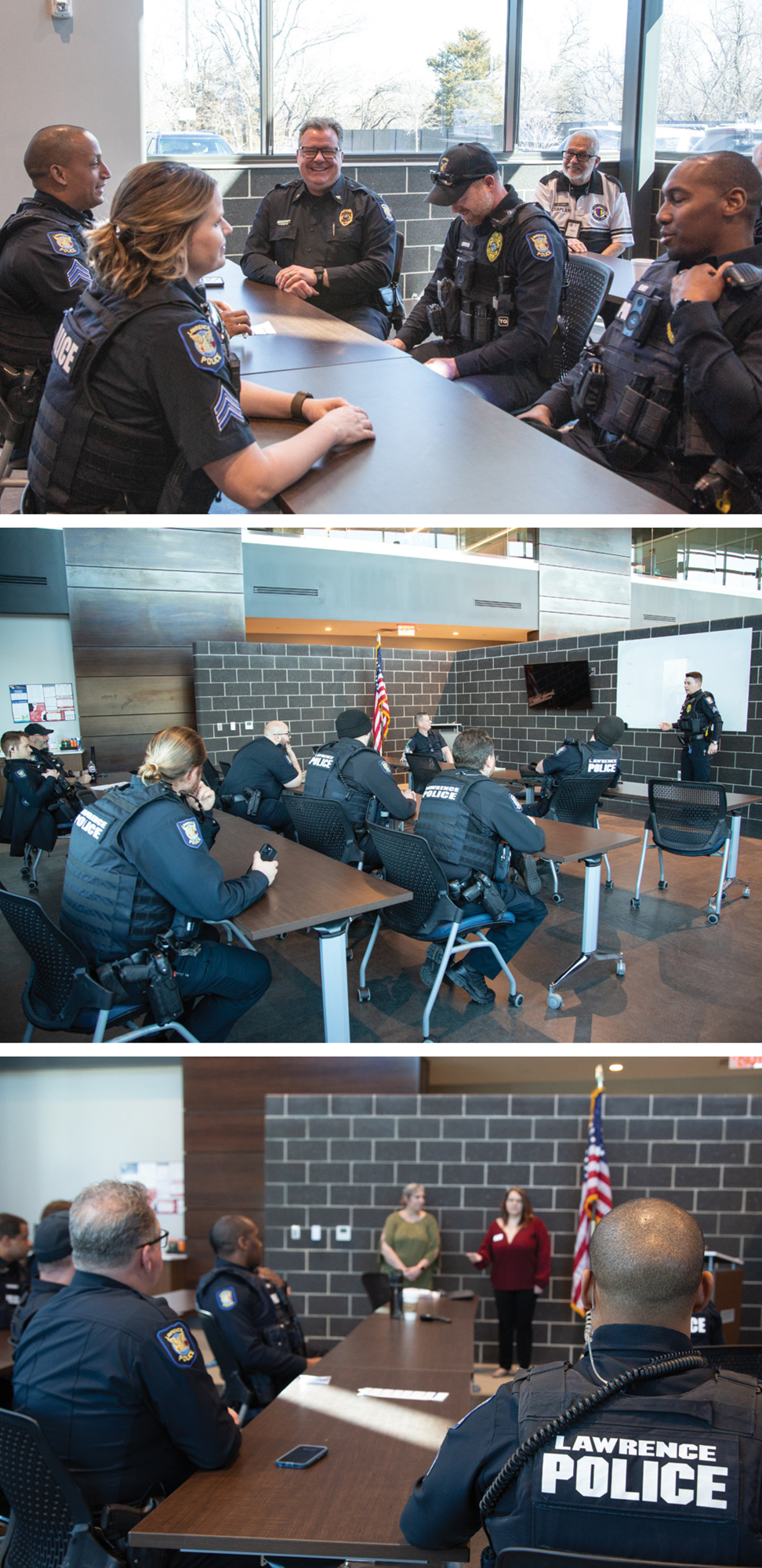
top to bottom: Police Chief Rich Lockhart enjoys his daily meetings with his officers; Police briefings occur everyday before every shift with the Lawrence Police; Mother’s Against Drunk Drivers speak with Lawrence Police about their personal experience’s
Get Out of the Car
Perhaps the real centerpiece to the community policing initiative is the aforementioned Lieutenant Grady, the former school resource officer who took a young, disillusioned Harvey Jr. and helped mentor him into becoming a police officer himself.
Like Harvey Jr., Grady didn’t have the easiest upbringing. Growing up in Merriam, Kansas, he lived mostly with aunts and uncles from the age of 9. He admits he never was much of a student. But football was his salvation, and he ended up playing at Fort Hays State University, where he achieved an bachelor’s degree in social work and master’s degree in political science and justice studies.
He would go on to coach football at Fort Hays State, but he says once he became a father, economic realities forced him seek another career. Becoming a police officer seemed a natural move—but only as the kind of police officer he envisioned for best serving his community.
“The biggest thing I’ve always tried to do is establish relationships,” says Grady, who’s in his 21st year with the LKPD. “I don’t believe in the ‘us versus them’ mentality, because for most of my life, I was them.
“To be an effective police officer, you have to get out of the car,” he continues. “We didn’t have computers in the cars when I started. That can take away the human side of policing.
“You’ve got to know people. That’s the only way to get out and know the community,” Grady adds.
One of Grady’s primary tasks is directing the SRO program, which has produced the last two Kansas SROs of the Year. Grady himself was SRO of the Year in 2011.
“We have great people in the SRO program,” he says. “I think it’s a great microcosm of the department. There’s a great diversity of people. And it allows patrol officers to do their jobs a little easier, because SROs have forged relationships.”
Incentivizing Good Behavior
Officer Lindsay Bishop is a School Resource Officer at West Middle School who knew she wanted a career that made a difference in people’s lives. For the last 17 years, she has served the families of Douglas County as a social worker then a police officer, devoting most of her career to investigating crimes against children.
She says being an SRO is probably the most rewarding position she’s held, but she’s much more than an officer patrolling a school. She’s also a peer, a counselor, and many times just a friend who listens.
Bishop says her approach to being an effective SRO is three-pronged. Of course, there’s providing safety and security to students and staff. But there’s also educating students and staff on things such as internet safety and career paths. Finally, there’s the relationship building, being a trusted adult students can lean on when in need.
“Kids often remember interactions with police officers their whole lives,” says Bishop, who remains a licensed social worker. So when she’s not patrolling the school, she often can be found playing a hand of UNO with students or serving pizza. She’s even performed mock interviews with students. She also created the “Caught You Doing Some Good” award. It comes with police cup, candy, prizes and a certificate, and the student gets a picture with Officer Bishop for the parent newsletter.
“My job to protect the students is a just-in-case job,” Bishop says, “and I train for that and am willing and ready to risk my life for these students every day. My favorite part, however, is watching them take the risks—playing a sport, participating in organizations like Model UN—putting themselves out there when they don’t have to. Adults just don’t behave like this.
“It’s amazing to watch day after day. It’s inspiring, and it’s inspired me,” she says.
Equally inspiring, Bishop adds, is the diversity and accomplishment that lives within the department for which she works devotedly.
“The education and diversity in this department is so amazing,” she says. “There are tons of college athletes. There’s even an aerospace engineer. There are people who were born here and people born in other countries.
“What you bring in determines how you do the job. That’s what makes this a strong place to work,” Bishop says.

